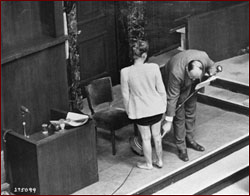
|

|
Hypothermia expert Dr. Robert Pozos had immersed hundreds of volunteers into ice water in the years after he founded the University of Minnesota's Hypothermia Laboratory in 1977. (He is no longer affiliated with the university.) But he never let a participant's temperature drop more than 3.6°F (i.e., below 95°F). Unburdened by even the slightest sense of humanity, the Nazi hypothermia experimenters, on the other hand, let their victims' interior body temperatures drop to 79.7°F before attempting to revive them. Most died an excruciatingly painful death as a result. However, some did revive, and the Nazis found that rapid rewarming in hot water proved the most effective way to revive them. In an ethical world, such data would not exist, but they do exist and could benefit humanity. Should they simply be lost to science? "Dr. Rascher, although he wallowed in blood ... and in obscenity ... nevertheless appears to have settled the question of what to do for people in shock from exposure to cold ... The final report satisfies all the criteria of objective and accurate observation and interpretation ... The method of rapid and intensive rewarming in hot water ... should be immediately adopted as the treatment of choice by the Air-Sea Rescue Services of the United States Armed Forces."—Maj. Leo Alexander, U.S. Army doctor who served as aide to the chief counsel of the Nuremberg war-crimes trial and authored an oft-cited 1945 report on the Dachau hypothermia experiments. While Alexander later concluded the results were undependable, other medical experts, most recently hypothermia researchers Robert Pozos and John Hayward, have claimed that the data are useful [36] 
References 36. Siegel, p. 1. 37. Katz, Jay and Robert S. Pozos. "The Dachau Hypothermia Study: An Ethical and Scientific Commentary." In Caplan, p. 137. 38. Moe, p. 5. 39. Ibid. Photo: National Archives, courtesy of USHMM Photo Archives The Director's Story | Timeline of Nazi Abuses Results of Death-Camp Experiments: Should They Be Used? Exposing Flawed Science | Resources Transcript | Site Map | Holocaust on Trial Home Editor's Picks | Previous Sites | Join Us/E-mail | TV/Web Schedule About NOVA | Teachers | Site Map | Shop | Jobs | Search | To print PBS Online | NOVA Online | WGBH © | Updated October 2000 |
